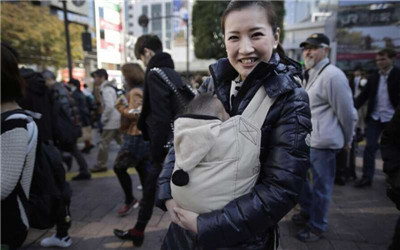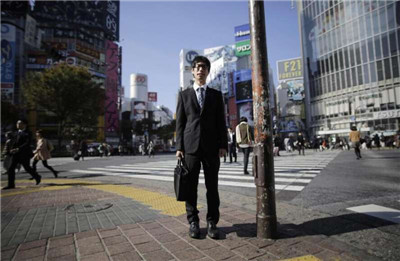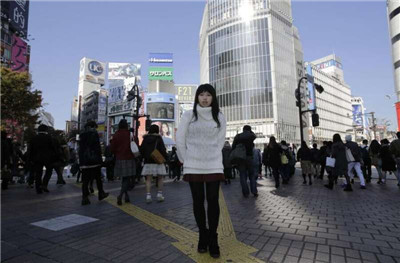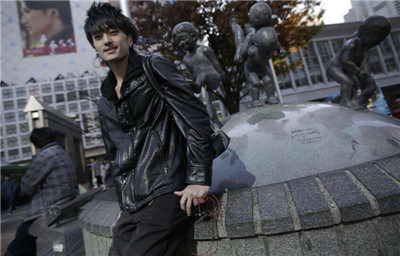(单词翻译:单击)
In this Friday, Nov. 21, 2014 photo, Mai Yamaguchi, a 29-year-old trading company employee heading into the gaudy Shibuya shopping area for an outing with her 4-month-old son and two other young moms and babies, poses for a portrait at a scramble crossing in Shibuya in Tokyo. Japanese Prime Minister Shinzo Abe's choice last week to postpone a sales tax hike to help fend off recession comes less as a relief than as cause for greater concern over how the country will cope with its ballooning national debt. Yamaguchi was unimpressed by Abe's decision. "I'm grateful to Mr. Abe for his policies to improve childcare, but putting off the tax increase, well, they say the pension system is on the verge of bankruptcy. I think it would have been better to go ahead and raise the tax as planned," said Yamaguchi. (AP Photo/Eugene Hoshiko)
本周五,2014年11月21日。照片中的女士名叫山口舞,是一名29岁的外贸公司职员,她正带着4个月大的儿子去涉谷购物区游玩,同行的还有另外两个带孩子的母亲。图中他们正在东京川流不息的涉谷街头争相摆pose拍照。日本首相安倍弯人上周决定推迟消费税的上涨,以期在一定程度上缓解日本的经济衰退。但相较于这种大场面,日本全国上下如何面对其国家债务的膨胀更值得关注。山口表示非常不满安倍的决定。“我对于安倍发展儿童教育的政策非常感激,但就算不说税率上涨,他们说养老保险制度以及到了崩溃边缘,但我觉得它应该会更好而增税计划应当如期推进。”山口说道。(美联社照片/尤金星野)

TOKYO (AP) — When Prime Minister Shinzo Abe responded to Japan's surprise recession by delaying a sales-tax increase, it was a cause for worry, not celebration, for many young Japanese. This generation, barely aware of their country's economic heyday, frets that putting off tough decisions now could make the future even worse.
Despite Abe's unprecedented stimulus efforts — almost everything short of dropping money from helicopters — Japan has slipped into recession less than two years after the last one. With the country's debt rising, population aging and job security fading, young people in particular wonder when, and if, Japan will bounce back.
东京(美联社)——当日本首相安倍弯人回应日本民众对于推迟增加消费税的惊讶之潮时,引发了一片担忧而非庆贺,尤其对于年轻的日本人。这一代人几乎没有体会到自己国家经济的鼎盛时期,他们对于推迟消费税上涨感到焦躁,担心未来可能会更加糟糕。
尽管安倍实施了空前的刺激措施——几乎就是直接从直升机上撒钱——但此后不到两年日本再次陷入经济衰退之中。随着国家债务的增加,人口老龄化和就业保障的衰弱,年轻人特别疑惑什么时候日本经济才会反弹。
"This is our children's future," said Mai Yamaguchi, a 29-year-old trading company employee heading into the gaudy Shibuya shopping area for an outing with her 4-month-old son and two other young moms and babies. "Child care, elder care, social welfare are all going to be even bigger burdens for us."
Under pressure to reduce the developed world's heaviest per-capita debt burden, at over a quadrillion yen ($8.5 trillion), Abe raised the sales tax from 5 percent to 8 percent in April, and was supposed to increase it to 10 percent next year. But after the economy, already fragile after two decades of malaise, shrank for two quarters in a row, he put off the second increase until 2017.
“未来属于孩子们。”山口舞说道。他是一名29岁的外贸公司职员。她正带着4个月大的儿子去涉谷购物区游玩,同行的还有另外两个带孩子的母亲。她正带着4个月大的儿子去涉谷购物区游玩,同行的还有另外两个带孩子的母亲。“孩子们要养,老人也要养,对我们这些人来说这些都是越来越重的负担。”
在需要消减世界上最重的人均债务负担(一千万亿日元,8.5万亿美元)的压力下,安倍在4月份把消费税从5%上调到了8%,并计划在来年上跳到10%。但日本经济经过20年的萎靡不振已经非常脆弱,并且又已经连续两个季度缩水,安倍决定把第二次消费税上调推迟到2017年。
Yamaguchi was unimpressed by that decision. "I'm grateful to Mr. Abe for his policies to improve child care, but putting off the tax increase, well, they say the pension system is on the verge of bankruptcy. I think it would have been better to go ahead and raise the tax as planned," she said.
The generation born as Japan's economic bubble burst in the early 1990s will be supporting a vast cohort of retirees. Though their nation is rich, with ultra-modern public transport, low crime rates and excellent public health services, most are making do without the security of lifetime employment enjoyed by their parents and grandparents.
山口非常不满这一决定。“我对于安倍发展儿童教育的政策非常感激,但就算不说税率上涨,他们说养老保险制度以及到了崩溃边缘,但我觉得它应该会更好而增税计划应当如期推进。”他说。
他们这代人出生于日本经济泡沫刚刚破灭的1990年代,低犯罪率和出色的社保服务,大多数都是他们父母和祖父母这一代所享受到的。

In this Friday, Nov. 21, 2014 photo, Ryosuke Sunaga, a college senior, poses for a portrait at a scramble crossing at Shibuya shopping district in Tokyo. Japanese Prime Minister Shinzo Abe's choice last week to postpone a sales tax hike to help fend off recession comes less as a relief than as cause for greater concern over how the country will cope with its ballooning national debt. Sunaga is acutely aware that he'll be supporting an ever growing number of retirees throughout his future career. “Speaking clearly, they just postponed it. In the end the tax will go up to 10%, to me it seems they are just using a temporary expedient and I don't really approve,” Sunaga said. "I don't really like the idea of higher taxes, but to a certain extent there is no avoiding passing the burden on to the younger generation. By the time I have kids the sales tax will probably be 15%, I'm thinking that will be tough. But compared to Europe the sales tax is still relatively low so raising it to 10% seems unavoidable to me." (AP Photo/Eugene Hoshiko)
本周五,2014年11月21日。照片中的人名叫须永凉介,一名准大学毕业生,在东京的涉谷街头摆pose拍的。日本首相安倍弯人上周决定推迟消费税的上涨,以期在一定程度上缓解日本的经济衰退。但相较于这种大场面,日本全国上下如何面对其国家债务的膨胀更值得关注。须永敏锐的意识到在他今后的职业生涯中将面对不断增加的退休老人。“说白了他们只是推迟了增税,说到底还是要涨到10%的。对我来说他们这样做只是权宜之计,我是肯定不会同意的。”须永说道。“说实话我不喜欢高税收,但一定程度上说这个重担无论如何都无法避免落到年轻一代人的身上。等我有孩子的时候消费税已经涨到15%了,我想那肯定会非常艰难。但看看欧洲的税收,涨到10%仍然是比较低的,而它注定要落到我身上”(美联社照片/尤金星野)
Meanwhile, Japan's economy is being eclipsed by neighboring China, whose up-and-coming tech and industrial companies are increasingly potent rivals.
Low birth rates and increased life expectancy mean that Japan's working age population is thinning out while the number of retirees and centenarians is swelling. The rapid aging of Japanese society is so evident in the mix of pedestrians on the street, in the media and in political discourse that it's an issue on just about everyone's mind.
Ryosuke Sunaga, a college senior decked out in his best job-hunting suit and brand new briefcase, said that by the time he has kids, he expects the sales tax will be at least 15 percent.
与此同时,它的邻居中国那些不断崛起的高科技企业和庞大的工业不断发展,使得日本经济相比之下黯然失色。
低出生率以及平均寿命的延长意味着日本的劳动人口薄弱,而退休人员和百岁老人不断增加。日本人口的快速老龄化在大街上尤为明显,在媒体和政治层面也常被提及,已经成为了每个人心中的问题。
须永凉介,一个准大学毕业生。穿着它最好的求职装束和崭新的公文包。他说估计当他有孩子的时候消费税至少已经上涨到15%了。
On Friday, Abe dissolved parliament for a Dec. 14 snap election he is calling to seek public approval of the tax hike delay and to affirm public support for his all-or-nothing policies to revive the world's third-largest economy.
He has pledged to vanquish Japan's long stagnation by injecting tens of trillions of yen (hundreds of billions of dollars) into the economy, pushing prices higher and the value of Japan's currency lower. He also has promised a sweeping and drastic overhaul to help improve the country's crumbling competitiveness.
周五,安倍在议会就12月14日提前大选的会议散会后,呼吁日本大众认可他推迟增税计划,并且就他可有可无的政策寻求民众支持,以期复习全球第三大经济体。
他已经承诺将注入几十万亿日元来战胜日本长期的的经济衰退和停滞。(相当于数千亿美元),推动产业价值走高和日币汇率降低。他还含泪承诺要彻底改革以提高和改变该国摇摇欲坠的竞争力。

In this Friday Nov. 21, 2014 photo, Kaori Endo, a 21-year-old bread factory worker from Ibaraki, north of Tokyo, poses for a portrait at a scramble crossing at Shibuya shopping district in Tokyo. Japanese Prime Minister Shinzo Abe's choice tlast week to postpone a sales tax hike to help fend off recession comes less as a relief than as cause for greater concern over how the country will cope with its ballooning national debt. Endo said she wouldn't mind paying more for taxes if she felt like she might benefit from them. But her bigger concern is getting a permanent job. “Right now I'm living with my family but I'm thinking about how I will support my parents,” she said. Endo is hoping the government will be able to handle its growing debt and other problems. “I want to be hopeful,” she said. “This is the country I was born in so I want to believe in it.” (AP Photo/Eugene Hoshiko)
本周五,2014年11月21日。照片中的女生名叫远藤香织,今年21岁,是茨城面包厂的工人。在东京北部涉谷的十字路口拍摄。日本首相安倍弯人上周决定推迟消费税的上涨,以期在一定程度上缓解日本的经济衰退。但相较于这种大场面,日本全国上下如何面对其国家债务的膨胀更值得关注。远藤表示只要能够从中受益,他不介意付出更多的税。但他更担心的是如何获得一份长期稳定的工作。“现在我还和家人住在一起,但我很担心怎么给父母养老。”他说。远藤希望政府有能力控制债务增长和其他的问题。“我希望看到救赎”他说“这是生我养我的土地,我希望能相信它。”(美联社照片/尤金星野)
So far, that combination, dubbed "Abenomics," has yielded mixed results.
Profits of big exporters have surged, thanks to the weaker yen, but higher costs have hit households and smaller companies. Despite some wage increases, many ordinary Japanese feel less well off than before, thanks to longer-term declines in wages and purchasing power.
"I'm not a permanent employee, and that worries me," said Kaori Endo, a 21-year-old bread factory worker from Ibaraki, north of Tokyo.
"Right now I'm living with my family, but I'm thinking about how I will support my parents. If I were a full employee, my parents would be less worried," said Endo, who plans to take professional tests to help improve her job status.
迄今为止,名为安倍经济学的组合拳已经产生了复杂的结果。
得益于日元的贬值,大出口商的利润大幅上涨,但成本较高的中小型企业尽管获得了一定的增长,许多日本民众却感到大不如前,这都要感谢长期下降的工资和购买力。
“我不是正式职员,这可愁死我了”远藤香织说道。他21岁,在东京北部的茨城面包厂工作。
“现在我还和家人住在一起,但我很担心怎么给父母养老。如果我有一份长期稳定的工作,父母会少担心很多。”远藤说。他表示正计划考些专业证书以找到一份更好的工作。
Over the past two decades, Japanese manufacturers struggling to compete with rivals in China have grown increasingly reliant on temporary or contract workers. Budget cuts have extended such practices into other fields such as teaching and nursing. Today, about four in 10 Japanese work in part-time or contract jobs with little job security and scant benefits. For young Japanese, permanent, career-track jobs are the exception, rather than the rule.
在过去的20年里,日本在对手中国的竞争压力下对于临时工和合同工的依赖不断增长。并且不断消减的预算也使得这种做法延伸到了其他领域,比如医疗和教育。如今10个日本人里大约有4个是兼职或者合同工,几乎没有工作保障且毫无利润可言。对于年轻的日本人永久的,稳定的职业轨迹非常少见。

In this Friday, Nov. 21, 2014 photo, Yuto Tanaka, a college student, poses for a portrait in Shibuya shopping district in Tokyo. Japanese Prime Minister Shinzo Abe's choice last week to postpone a sales tax hike to help fend off recession comes less as a relief than as cause for greater concern over how the country will cope with its ballooning national debt. Tanaka, 19, says he's an Abe supporter and agrees that the tax hike should be put off. But in the longer run, Japan needs to reform its social welfare system, among many other things, says Tanaka, who hopes to become a teacher. "I think we should consider what sort of society we want," he said. "There are big, systemic problems I personally cannot fix. But we have to each think about what we can do as individuals." (AP Photo/Eugene Hoshiko)
本周五,2014年11月21日。照片中的男人名叫田中佑都,是个大学生,照片拍摄于东京涉谷商圈。日本首相安倍弯人上周决定推迟消费税的上涨,以期在一定程度上缓解日本的经济衰退。但相较于这种大场面,日本全国上下如何面对其国家债务的膨胀更值得关注。田中今年19岁,他是安倍弯人的支持者,并认为增税应当被延迟。但就长期来说,日本在许多其他问题中首先需要改革它的经济制度。田中表示他想成为教师。“我认为我们应该考虑下我们需要的是一个什么样的社会。”他说“有些问题很大,非常系统化,我个人无力解决。但是我们每个人都应该想想自己能够做些什么。”(美联社照片/尤金星野)
As lawmakers rush to prepare for the election, Abe is renewing his campaign to persuade Japanese companies to raise wages and offer more opportunities for women workers. He also has promised to slash corporate taxes beginning next year to entice companies to invest more in Japan.
In the meantime, Abe has been pushing ahead with cuts to social welfare, raising health insurance premiums and co-payment requirements for all, including retirees.
Ultimately, Japanese taxpayers will end up shouldering an even greater share of the country's surging costs for health insurance, elder care and pensions, said Koichi Hamada, an economic adviser to Abe.
"It's not very fair to poorer constituents, but still we have to go ahead with the consumption tax hike," Hamada said.
作为立法者安倍弯人急于为选举做准备,他更新了它的竞选说辞说服日本企业提高工资,并提供女工更多的工作机会。他还承诺从明年开始将削减企业税收,以吸引企业更多在日本投资。
在此期间,安倍弯人一直推进削减社会福利,提高医疗保险费以及对所有人的共同费用分摊,也包括退休人员的。
最终,日本纳税人将承担更大份额的国家医疗保险成本飙升,社保和养老金,安倍晋三的经济顾问浜田宏一说。
“这对经济拮据的选民不是很公平,但我们必须推进消费税上调”滨田说。
College student Yuto Tanaka, 19, said he knows that there's millions of yen (tens of thousands of dollars) in debt for every person in Japan. But fretting won't resolve that problem, and neither would an immediate tax hike, he said.
"If they raise the sales tax now, it will hurt the economy and tax revenues will fall anyway," said Tanaka, taking a break at the bustling intersection in Shibuya known as "Scramble" before heading to classes.
"We have to hope," he said. "If Japan falls to pieces, our society will be finished. We have to muddle through."
大学生佑田中今年19,他说他知道每个日本人身上都承担了几百万日元的债务(数万美元)。但微调不会解决这个问题,即便立刻加税也没用,他说。
“如果他们现在提高销售税,会伤害到整个经济而税收收入会不升反降。”田中在涩谷繁华的路口若有所思的说。他正在去上课的路上,稍微歇息一下。
“我们必须保持希望”他说。“如果日本瓦解,我们整个社会就完了。我们必须撑过去。”


